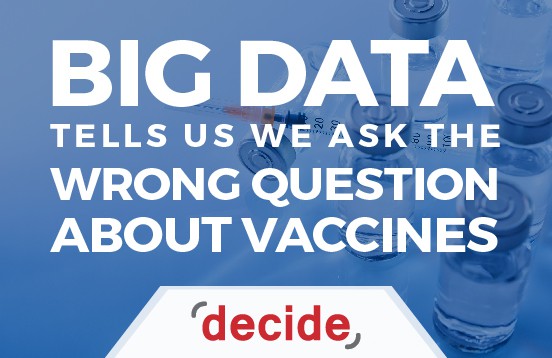 The issues and questions wrapped up in the “vaccinate or not” debate are reaching an unprecedented high this week. Outbreaks of previously ‘dead’ diseases are bringing these debates back to the bright lights of mainstream media. From Facebook to CNN, articles arguing for and against vaccination are rampant, and everyone who writes and shares these articles has a detailed, emotional argument. It is an issue easy to argue from the desk chair, typing away, secure in an idea of how things are. But out in the real world, for parents, the issue becomes much more messy. Nearly a year ago, we published a post on Vaccines, but in light of recent activity, the topic deserves revisitation.
The issues and questions wrapped up in the “vaccinate or not” debate are reaching an unprecedented high this week. Outbreaks of previously ‘dead’ diseases are bringing these debates back to the bright lights of mainstream media. From Facebook to CNN, articles arguing for and against vaccination are rampant, and everyone who writes and shares these articles has a detailed, emotional argument. It is an issue easy to argue from the desk chair, typing away, secure in an idea of how things are. But out in the real world, for parents, the issue becomes much more messy. Nearly a year ago, we published a post on Vaccines, but in light of recent activity, the topic deserves revisitation.
The questions start in the early stages of parenthood. Option upon option, constant decisions, and each one has potential for extreme consequences. As a parent you are forced to make decisions for another human, decisions which impact their life forever. Being an early parent means constantly hunting for knowledge, for data and experience that can inform your decisions. There is plenty of opinion out in the internet, copious articles of parenting advice. But when it comes down to facts about the exact consequences of early childhood choices, very little can be found. So parents are left to wander around in the dark, hoping their choices are legitimate and solid. It is a brave and scary thing to be a parent.
Some of the questions these parents are asking are the ones which are today held in so much contention. “Should we vaccinate?” “What are the side-effects of vaccination?” “Are vaccines related to autism?” “How can I keep my child as safe and healthy as possible?” The problem is that these questions have no answers. No one can yet give accurate, authentic answers. This is from pure lack of data. We do not yet have the healthcare data needed to prove beyond doubt that vaccines are either harmful or safe. Nor do we have enough data to start figure out the exact nature of autism. As long as people continue to pursue answers to these questions they will find them in emotional articles and advice pieces. Instead, we should begin to ask the right questions, “How can we fi

gure out the nature of vaccines?” “What does the data say about vaccination, and how can I assist in furthering the scope of that data?” “How can I use the technology I have to further our knowledge of the nature of vaccinations?”
We can continue to discuss the benefits and detriments of vaccines for another year, but so long as it remains an opinion driven conversation we will be able to write the same post in February 2016. Instead, lets pursue the data, the facts, and continue pushing our mobile healthcare technology to collect and analyze that data. Just with the data we’ve discussed on this blog, like the storage and analytical power of google, or potential information logs, we could certainly make advancements in our knowledge. Hopefully we can read an article a year from now describing the data gathered on vaccines, and the knowledge and action plans that are now available from that data. Instead of wandering in the dark, parents can begin to make fully informed decisions and rest in that confidence.